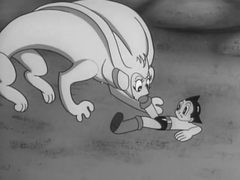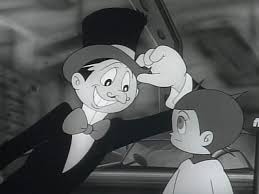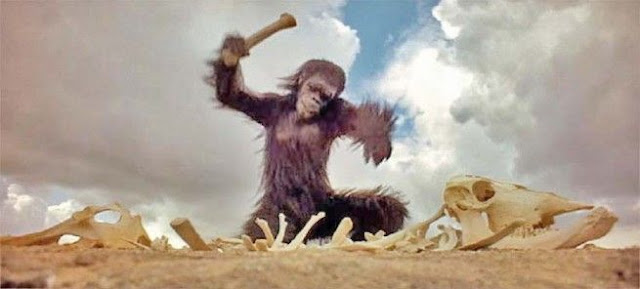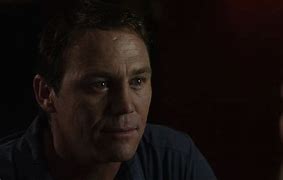PHENOMENALITY: *marvelous*
MYTHICITY: *fair*
FRYEAN MYTHOS: *adventure*
CAMPBELLIAN FUNCTION: *cosmological, psychological, sociological* Some specifications first: Japan produced 193 episodes of TETSUWAN ATOM, the first animated TV show the country marketed abroad, from the Osamu Tezuka work of the same name. However, only 104 episodes were translated into English, which ran from 1963 to 1965 under the name "Astro Boy." To my knowledge few if any of the other 89 episodes have been translated into English or into any other non-Japanese language, so my review of the series is necessarily truncated. Because I can only reference the English episodes, in this review I'll also use the American names for the episodes and for all of the characters, though I'm aware that one can find the alternate cognomens on the web if one so desires. I should also mention that I've little knowledge as to which episodes adapt specific Tezuka stories and which ones are original productions, so I won't make mention of the adaptation factors.
Although ASTRO was produced with child-viewers in mind, it's a much better science-fiction television series than most of those that preceded it and many of those that came after. True, there's a lot of silly kid-humor in most of the episodes, and frequently the animators would throw in the sort of gags only feasible in cartoons, like having characters' faces morph into weird shapes after said faces get punched. Nevertheless, most episodes possess a strong grounding in the tropes of "sense of wonder" science fiction, and a good sampling possess high mythicity in terms of their cosmological, psychological or sociological patterns. Since so many episodes were made for ASTRO's two seasons, I'll only review the high-mythicity episodes below, though I might argue that all of them at least touch on Tezuka's master trope: "Robots are people too." By that I don't mean that the "God of Manga" erased all distinctions between mechanical people and organic human beings. But Tezuka's robots possess the same affective range as, say, the star of Disney's PINOCCHIO, and this capacity makes both Disney's puppet and Tezuka's robots *essentially* human. Because of this commonality, Tezuka does not really imagine his robots as mere mechanisms that emulate human behavior, as sci-fi author Isaac Asimov would. And because these robots possess essential humanity, many episodes of the TV show, like the 1952 manga, assert that robots should have civil rights like human beings. Tezuka's robots are the ultimate marginalized group: they really aren't humans, in the way that members of marginalized races or religions are still humans. But it becomes essential that in a forward-looking society as that of Astro Boy's 2013 era, robots should be treated as humans.
"The Birth of Astro Boy"-- in many ways, Astro's origin remains the standout story even among other resonant stories. The narrative feels much like an inverted version of PINOCCHIO. In place of Geppetto, a father who ceaselessly sacrifices himself for an often thoughtless son, Astro Boy is created by the thoughtless narcissism of Professor Boynton, who makes a robot duplicate of the small son Boynton lost in an accident. When Boynton belatedly realizes that the little robot cannot take his son's place, he callously sells Astro to a circus, and, in the English episodes at least, is never seen again. A second "bad father" takes Boynton's place: an unscrupulous ringmaster whom the translators named "Cacciatore" (possibly a callback to the evil Italian Stromboli in Disney's PINOCCHIO). Cacciatore forces Astro to battle other robots in arena-fights, much to the innocent automaton's displeasure. But a good father, the huge-nosed Doctor Elefun, seeks to free Astro from the ringmaster, and he ultimately succeeds in doing so when the government passes a "robot emancipation act" (almost certainly based upon the Emancipation Proclamation of the 1800s). Astro then joins Elefun in a variety of adventures, and Elefun even creates a robot family for Astro: father, mother and little sister Astro Girl. (There's also a "brother" who's introduced in later episodes, but he doesn't assume much importance.)
"Expedition to Mars"-- as if to test Astro's status as a free being, he's assigned to captain a vessel going to Mars. Not surprisingly, a number of human crewmen don't like being bossed around by a robot. "The Sphinx"-- Is the huge creature Astro encounters in the desert the real Sphinx of legend? Of course not, it's another robot, but the real story of the riddling monster is related during the episode, which conveys a certain level of mythicity.
"Hullabaloo Land"-- In a foreign country given the semblance of a fairy-tale land, a huge tyrant, Baron Von Hoodwink, seeks to bend an innocent robot named Princess Lollipop to his will. No sexual overtones appear, though Lollipop's ability to morph into a swan suggests that there was some influence from European swan-maiden tales.
"Ditto"-- for the first time, a young robot named Ditto is elected to the presidency of a foreign country. Ditto's own creator Deadcross seeks to overthrow the new ruler, and Astro comes to Ditto's rescue.
"Astro Boy Goes to School"-- Astro realizes that he doesn't share some human capacities, like the ability to appreciate beauty. He thus enrolls in a human middle school. Amid various hijinks, Astro does make a little progress toward his goal of greater humanity. "Dream Machine"-- Astro. who like other robots has no ability to dream, participates in an experiment to see if a device can give him this human experience.
"Mighty Microbe Army"-- In a fascinating anticipation of FANTASTIC VOYAGE, Astro and Doctor Elefun must diagnose a space traveler's malady by shrinking themselves to microbe-size and entering the man's body for a closeup look.
"Contest in Space"-- was this a riff on Frederic Brown's "Arena" before STAR TREK did its sanctioned adaptation? No way to know, but it's the same setup. Aliens select two representatives of Earth to fight other ETs with the survival of one team's homeworld at stake. The Earth-reps are Astro and a criminal fugitive, and initially the crook doesn't care if his world perishes. But a virtuous little robot shall lead him...
"Mystery of the Amless Dam"-- Robot-human tensions heighten in the city of Amless, due in large part to the influence of reactionaries like "Boss Barker." When a human child disappears, the locals blame robots, claiming that the automatons should never have been liberated. The persecuted machines barricade themselves at the local dam, claiming innocence, and Astro Boy jets over to help. But it seems Barker reached out to a kindred spirit, Astro's former master Cacciatore, who brings two big robots and a bunch of small manta-like creatures to subdue the hero. The missing boy shows up to help Astro and to vindicate the local robots, and everyone makes nice. "Jungle Mystery"-- In a story that's both wacky and sentimental, Astro Girl gets hired to play a movie-role, that of a Tarzan-like boy. While the movie shoots in a real jungle, Riva, the immortal queen of a remote valley, spies what she mistakes for a young man, and abducts Astro Girl to be Riva's new husband. Astro follows to rescue his sister and learns that there's an alien force that has made Riva and her valley immune from death. (By the way, though Astro Girl is not as powerful as her brother, she often plays the role of "fighting female" in various episodes.)
"The Mighty Mite from Ursa Minor"-- Though this episode aired after "Amless Dam," both in Japan and in the US, it feels like the script for this one was written earlier, because of the way it portrays Cacciatore and one of his minions. The scheming ringmaster comes across a young boy with super-strength, and though the boy only wants to find his way home, Cacciatore hoaxes the boy into fighting a huge man named Saturno in an arena for the entertainment of patrons. Then Cacciatore realizes that the boy is an alien, so the ringmaster may be in legal trouble because he's only supposed to have humans fight humans in his circus. Astro Boy must intervene to make sure the mighty mite gets back to Ursa Minor. The continuity problem arises because in "Amless Dam" the villain not only says that Saturno is a robot, the assertion is proven when a young boy drains Saturno of his power to re-energize Astro. And the last high-mythicity episode of the English-language episodes in my view is "Mystery of the Metal Men," which chronicles Astro's only voyage to an alternate universe. An explosion hurls the little robot into a world where Astro Boy never existed, because Doctor Boynton never lost his son Astor and so never invented his robot replacement. Once Boynton and Elefun accept that Astro really does come from an alternate timeline, they help him get back, though first Astro has to use his powers to help them out of their "metal men" difficulties. And just to show Astro's unceasing virtue, he even renders advice to Astor to help the youth relate to his father better-- even though to Astro, Boynton was nothing but the father who cast him aside like trash.

















































